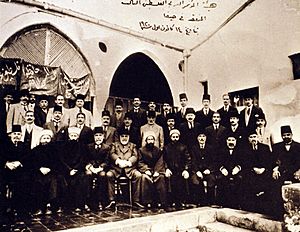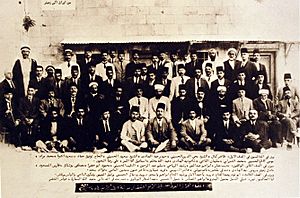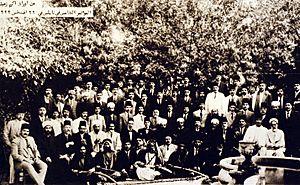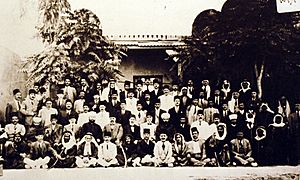Palestine Arab Congress facts for kids
From 1919 to 1928, people in Palestine held important meetings called the Palestine Arab Congresses. These meetings were organized by groups called Muslim-Christian Associations across the country. Seven congresses took place in cities like Jerusalem, Jaffa, Haifa, and Nablus. Even though many people supported these meetings, the British government, which ruled Palestine at the time, never officially recognized them. The British said these groups didn't truly represent everyone. The Palestine Arab Congresses started because the Arab people in Palestine wanted to stand up against British rules after the British took control in 1918.
Contents
- First Congress: Jerusalem, 1919
- Second Congress: Damascus, 1920
- Third Congress: Haifa, 1920
- Fourth Congress: Jerusalem, 1921
- Fifth Congress: Nablus, 1922
- Sixth Congress: Jaffa, 1923
- Seventh Congress: Jerusalem, 1928
- General Islamic Congress: Jerusalem, 1931
- Aftermath
- Other Palestinian Congresses, 1920–1930
First Congress: Jerusalem, 1919
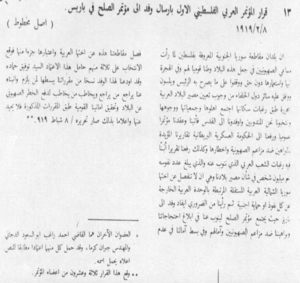
The first Palestine Arab Congress happened from January 27 to February 10, 1919. It was a response to Jewish immigrants settling in the area before World War I. About 27 representatives from Muslim-Christian societies attended. Aref al-Dajani, who led the Jerusalem Muslim-Christian Society, was in charge of the meeting.
The people at the congress sent a message to the Paris Peace Conference. They asked for the Balfour Declaration to be canceled. This declaration supported a Jewish homeland in Palestine. They also wanted Palestine to be part of an independent Arab government in Syria.
The congress decided:
- Palestine was part of Arab Syria. They felt connected by history, religion, and language.
- They did not want France to claim any part of the area.
- They wanted their region, Palestine, to be free from foreign control.
- All foreign agreements about the area should be canceled.
- They wanted to stay friends with Britain and its allies. They would accept help if it didn't stop Palestine from being independent.
They also decided to send people to Damascus and Paris to share their ideas.
Second Congress: Damascus, 1920
The British authorities had banned Arab political meetings. Because of this, the second congress could not meet in Palestine in May 1920. Some delegates sent a letter to the Syrian National Congress in Damascus. They asked them to form a Palestinian group to speak for Palestine in Europe.
Other reports say that Palestinian delegates met in Damascus on February 27, 1920. They wanted an independent Palestine within a united Syrian state. They spoke out against Zionism and asked for an end to Jewish immigration.
Later, on May 31, Palestinian people living in Damascus formed 'The Palestinian Arab Society'. This group protested against the British rule over Palestine. They also asked Muslims in India and the Pope for help. Some sources say a secret second congress happened in Palestine on May 31, 1920. It called for the return of political exiles and protested the Balfour Declaration being part of the British mandate.
Third Congress: Haifa, 1920
The third congress started on December 4, 1920, in Haifa. Thirty-six delegates attended, including important leaders like Musa al-Husayni, who became the president. He led the executive committee until he passed away in 1934.
The congress made several important decisions:
- They wanted Palestine to be part of an independent Arab state.
- They spoke against the idea of a homeland for the Jewish people in Palestine.
- They asked the British to create a government led by a group chosen by Arabic-speaking people. This government would be like the one in Iraq, with people voting for their leaders.
- They did not want the World Zionist Organization to be an official group. They also opposed Hebrew being an official language.
- They were against Jewish immigration.
- They said the British rule was not legal because the League of Nations had not yet decided on Palestine's status.
After the meeting, the executive committee met with the British High Commissioner, Herbert Samuel. He said they had to accept British policy on a Jewish national homeland to be officially recognized.
In March 1921, Musa Kazem led a group to meet Winston Churchill, a British leader. Churchill told them they had to accept the Balfour Declaration as a fixed part of British policy.
Fourth Congress: Jerusalem, 1921
The fourth congress took place on June 25, 1921. About 100 delegates attended. They decided to send a six-person group, led by Musa Kazim, to London. This group arrived in London in September and met with Winston Churchill. On their way, they also met Pope Benedict XV in Vatican City.
In response to the congress, High Commissioner Herbert Samuel promised that the British would "never impose a policy contrary to their religions, their political and their economic interests."
Fifth Congress: Nablus, 1922
The fifth congress started on August 22, 1922, after the group returned from London. Musa Kazem, their leader, said that there were still ways to make progress through talks. He also advised against using violence.
The congress passed these resolutions:
- They rejected the new constitution proposed by the British.
- They decided to boycott elections for a new Legislative Council.
- They planned to open an office in London.
- They decided to boycott Jewish goods, including electricity from Pinhas Rutenberg's company.
- They forbade selling land to Jews.
- They forbade Jewish immigration.
- They promised to oppose the creation of a Jewish national homeland.
Before the congress, the executive committee raised money for a general strike on July 13–14, 1922. They sold special stamps that showed the Dome of the Rock and said "Palestine for the Arabs."
Sixth Congress: Jaffa, 1923
The sixth congress was held from June 16 to 20, 1923, with Musa Kazim as chairman. They agreed to send another group to London. They also discussed not paying taxes, arguing that they should not be taxed without having a say in the government.
Twenty-four resolutions were passed. These included boycotting the Palestine Electricity Corporation and Jewish goods. In October, a more radical group called the National Party was formed. This group was against the Muslim-Christian Associations. The congress also supported the Arab Orthodox Movement. This movement was about Arab Orthodox Christians wanting more control over their church, which was led by Greeks.
Seventh Congress: Jerusalem, 1928
The seventh congress took place on June 20, 1928. It formed a united front with Musa Kazim as president. A 48-member executive committee was chosen. They decided to send a fourth group to London. This group left on March 21, 1930, after a report about the 1929 riots was published.
General Islamic Congress: Jerusalem, 1931
In 1931, a large meeting called the General Islamic Congress was held in Jerusalem. People from many different Islamic countries attended, not just Arabs. This meeting was organized by Haj Amin al-Husseini, a leader of the Supreme Muslim Council. He wanted to gather Muslim support for Palestinians.
On December 7, 1931, 145 delegates from 22 Islamic countries met in Jerusalem. They included important figures from Tunisia, Turkey, India, and Egypt. The congress lasted for two weeks. It confirmed the importance of the Al-Aqsa mosque and Palestine to all Muslims. They also planned to create an Islamic university and a land company. This company would help prevent Zionists from buying land in Palestine. The meeting ended by speaking out against Western control in Muslim countries.
This congress is often seen as the end of the Palestine Arab Congresses. It caused some division among Palestinian groups because it did not include Christians. None of the big plans from this congress fully happened. However, it did make Amin al-Husseini a stronger leader in the Palestinian movement against Zionism.
As the congress ended, a group of about 50 delegates formed the Istiqal Party.
Aftermath
After Musa Kazim passed away on March 27, 1934, no more Congresses were held. His role was taken over by different Palestinian Arab political parties. These parties represented the interests of specific families or places. Some of these parties included the Istiqlal (formed in 1932), the National Defence Party (1934), and the Palestine Arab Party (1935).
Other Palestinian Congresses, 1920–1930
Arab Orthodox Congress: Haifa, 1923
Arab members of the Greek Orthodox Church held a congress in Haifa on July 15, 1923. Many Arab Orthodox Christians were active in speaking out against Zionism. This meeting happened after the Patriarch of the Greek Orthodox Church sold land to Zionists.
The congress asked that the Patriarch not make decisions for the community without approval from a council. They also wanted bishops to be chosen by local councils. They asked for church leaders to know Arabic and for improvements in Orthodox education. A second Arab Orthodox conference was held in Jaffa in 1931.
Women's Congress
A Women's Congress, also known as the First Palestine Arab Women's Congress, was held in 1929. About 200 women attended. It was led by Salma al-Husayni, the wife of Musa Kazim.
 | Selma Burke |
 | Pauline Powell Burns |
 | Frederick J. Brown |
 | Robert Blackburn |


